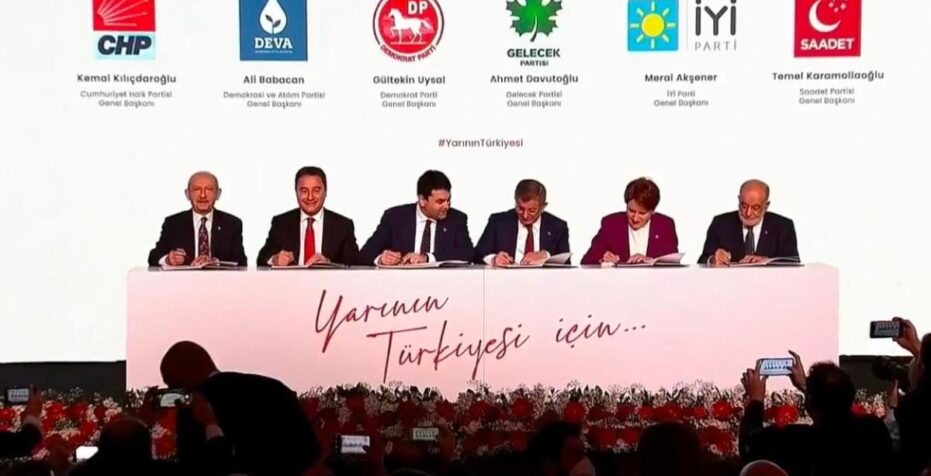Following their meeting on February 12, the leaders of six opposition parties signed the “Memorandum of Understanding on Reinforced Parliamentary System” in Ankara today (February 28).
The memorandum of understanding was signed by the main opposition Republican People’s Party (CHP), İYİ Party, Felicity Party (SP), Democrat Party (DP), Future Party and DEVA Party at a ceremony attended by the party leaders Kemal Kılıçdaroğlu, Meral Akşener, Temel Karamollaoğlu, Gültekin Uysal, Ahmet Davutoğlu and Ali Babacan, respectively.
The leaders came to the conference hall together. The meeting was also attended by nearly 700 representatives from civil society organizations, bar associations and unions as well as academics.
While the slogan of the meeting was “The Turkey of Tomorrow”, the parties’ logos were also to be seen on the main screen at the hall. The vice party chairs introduced the memorandum to the public.
‘An end to Presidential Government System’
Taking the floor first, CHP Vice Chair Muharrem Erkek answered the question of “Why is the Presidential Government System wrong?”
Criticizing the system for “causing personalization and arbitrariness in governance”, Erkek said that “it has led to an authoritarian governance by enabling the President to take the judiciary, executive and legislative under control and granting him highly wide and unrestrained powers.”
CHP’s Erkek also argued that the President, who is the member and the chair of a political party, has aggravated Turkey’s problems further. He stressed that introducing the Reinforced Parliamentary System does not mean returning to the past, but this move “aims to crown the Republic’s long-established state and Republican experience with democracy.”
‘An effective and participatory legislative body’
Taking the floor afterwards, DEVA Vice Chair Mustafa Yeneroğlu said that with the Reinforced Parliamentary System, they, as the six political parties, aim to introduce a “government system which complies with the traditions of participatory, libertarian and pluralist democracy and is based on the principle of separation of powers and effective checks and balances.”
Yeneroğlu noted that with this system, they also aim to reduce the electoral threshold from 10 to 3 percent and the parties which receive at least 1 percent of the votes at the Parliamentary elections will be able to benefit from the grants provided by the Treasury.
DEVA’s Yeneroğlu also said that the law-making processes will be democratized, signaling that the practice of enacting omnibus laws will be abolished and the President will be deprived of the veto power, which he said undermines the Parliament’s legislative functions.
Afterwards, Bülent Şahinalp from the DP, Ayhan Sefer Üstün from the Future Party, Bahadır Erdem from the İYİ Party and Bülent Kaya from the SP took the floor and talked about the proposed system.
Highlights from the memorandum
Some of the highlights from the memorandum of understanding signed by the six opposition parties are as follows:
- The electoral threshold will be reduced to 3 percent.
- The political parties which receive at least 1 percent of the votes at Parliamentary elections will be offered Treasury grants.
- No decrees shall be issued on matters pertaining to fundamental rights and freedoms.
- The President’s veto power will be removed.
- The quorum in Parliamentary investigations will be decreased.
- The President’s term of office will be 7 years.
- The President and the Cabinet of Ministers will not have the authority to declare a State of Emergency by themselves.
- The duties, powers and functioning of Criminal Judgeships of Peace will be amended.
- It will be ensured that the Constitutional Court and European Court of Human Rights (ECtHR) rulings are implemented immediately.
- The Board of Judges and Prosecutors will be dissolved. There will be two boards.
- The system which allows the establishment of more than one bar association in a province will be ended.
- It will be obligatory to ensure that at least three out of every four members of the Constitutional Court are legists.
- The Court of Accounts will be defined as a supreme court in the Constitution.
- TRT and Anadolu Agency (AA) will be restructured in line with the principles of independence and impartiality.
- Legal measures will be taken to prevent cartelization in the media.
- Legal regulations will be the case for the Radio and Television Supreme Council (RTÜK). Its members will be elected by the Parliament.
- The Public Tender Law will be amended.
- The share of tax income granted to local governments will be increased.
- It will be ensured that the ones elected by elections will leave office by elections. The practice of appointing trustees will be ended.
- The Council of Higher Education (YÖK) will be dissolved.
- Faculty members will elect their rectors themselves.
- The Law on Political Ethics will be drawn up.
- An electoral district will be formed in order to ensure that over 6 million citizens who live abroad are represented at the Parliament.
- It will be obligatory to disclose the donations made to political parties and candidates.
- The power of inspection of the Parliament will be reinforced.
- The pressure on freedoms of expression, meetings and demonstrations and association will be ended.
- It will be a state policy to establish and protect gender equality.
- Girls’ right to education will be guaranteed.
- The legislation cited when prosecuting journalists will be amended within the frame of the legal precedents of the Constitutional Court and the European Court of Human Rights (ECtHR).
- “Environment courts”, where the judges specialized in environmental issues will be on duty, will be established.
- The system of interviews and practice of trustees will be ended. People will be hired in the public sector based on the results of written tests.
(HA/SD)
